Introducing
The Rural Wisconsin Initiative
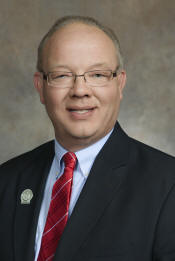
I was proud to be a part of a group of
out state legislators that introduced the Rural Wisconsin Initiative, a
package of seven pieces of legislation that we hope will spur a
conversation on opportunities in rural Wisconsin.
Bridging the Gap in Rural Wisconsin
Rural
Wisconsin is filled with excellent places to live, work, and raise a
family. However, this state’s small towns and villages are not exempt
from the American demographic trends of the last fifty years. Many rural
counties are losing population or barely maintaining population. When
young people leave for jobs in the city, or senior citizens choose to
retire to the suburbs, our communities become caught in a downward
spiral of decreasing vitality. As Representatives of rural Wisconsin, we
are working to bridge the urban-rural gap, and to start a conversation
about building our future.
We are introducing the Rural Wisconsin Initiative. This plan will be
ongoing, and will incorporate legislative suggestions from people across
the state. Together, we can make the changes that will ensure the
vibrancy of our communities for decades to come. To begin the
discussion, we have drafted seven bills that will improve education,
health care, industry, and technology in rural Wisconsin.
The first bill will increase available broadband expansion grant funds
from $1.5 million to $10 million per budget. Rural areas are still
woefully under serviced when it comes to high speed internet, and this
affects the abilities of our children to prepare for school, inhibits
communication between ambulances and hospitals, and can be a determining
factor in where businesses choose to locate. Bridging the technology gap
ensures that people in rural areas have the same access to opportunity
that people in urban or suburban areas do.
Of course, opportunity begins with a solid education, and education
begins with quality teachers. Currently, there is a nationwide teacher
shortage, and rural areas are feeling that shortage most acutely.
Following the recommendation of the Speaker’s Task Force on Rural
Education, we are proposing the expansion of a loan repayment program
for teachers, so that those who serve rural communities can be included.
Additionally, we are proposing the establishment of a grant for STEM
(science, technology, engineering and math) education development in
small rural schools. This will help develop tomorrow’s workforce today.
Many young people in rural Wisconsin are under the false impression that
they need to move to the city in order to get a good job. There are many
family supporting jobs available in rural areas, and we need to promote
that fact. That is why we are introducing legislation to expand funding
for both youth apprenticeship grants and tuition reimbursement programs
for apprentices. Increasingly, rural high schools, tech colleges, and
businesses are working together to equip young people with the skills
they need to succeed in our homegrown industries, as well as the
opportunity to earn college credit for their work. We feel the need to
increase funding to these programs to meet the growing demand, and to
close the skills gap that has left many rural industries unable to find
the employees they need to thrive.
In addition to retaining young Wisconsinites, we also need to increase
our efforts to attract out of state young people. That is why we are
introducing a bill, modeled on legislation from Kansas and Oklahoma,
which will assist in student loan repayment for those who choose to
relocate to Wisconsin. Our bill would repay up to $25,000 or 40% of
student loans, provided the recipient have a post-secondary degree, be
employed, and not be on any form of public assistance. Young families
increase the tax base, keep our schools full, and provide the talented
workforce we need to keep Wisconsin economically strong.
Not only do we want people to live and work in rural Wisconsin; we want
them to stay and retire here as well. Just as access to employment is an
important factor in where young people choose to live, access to health
care means more to senior citizens. That is why we are proposing a
funding expansion to the Wisconsin Rural Physician Residency Assistance
Program (WRPRAP). WRPRAP funds residency programs at rural hospitals,
which encourage young doctors to put down roots in our communities.
Additionally, some of the expanded funding would go toward bridging the
gap for women’s health services by training physicians in obstetrics and
gynecology.
Building the future in rural Wisconsin is a process, and one that needs
citizen input. As we wrote earlier, we want the Rural Wisconsin
Initiative to begin a conversation, and to be a continuing reflection of
what our constituents want. Please share your feedback and ideas at
www.RuralWisconsinInitiative.com.
Voting to Help Wisconsin Families
Fight Addiction
Giving H.O.P.E to Wisconsin families and
additional instruments to combat the ongoing opioid addiction in the state.
This week, I
was honored to support a package of bills that will give people that are
suffering from opioid addiction the help they need, and provide more tools
to fight Wisconsin’s opioid and heroin epidemic.
The Wisconsin State Assembly overwhelmingly approved four bills, which build
upon eight new laws from our H.O.P.E. Agenda (Heroin, Opiate Prevention and
Education). This session, the legislature continues our efforts to combat
this devastating problem by focusing on prevention and treatment methods.
I believe these bills help deliver some of the necessary instruments to
combat the ongoing opioid addiction in the state. These bills are making it
more difficult for addiction to start, and easier, if someone already
suffers from an addiction, to get the life-saving help our citizens need.
Under the bills, pharmacies will be required to report any prescription
painkillers filled within 24 hours, and all Wisconsin licensed physicians
will have to review the Prescription Drug Monitoring Program (PDMP) when
prescribing a monitored controlled substance.
In light of those, the Assembly also approved proposals that will help
prescribers, dispensers, and law enforcement gather and analyze data to
reduce problems like over prescribing, “doctor shopping,” and “pill mills.”
The legislation passed on Tuesday is the second part of a comprehensive plan
to fight this epidemic from all sides.
I am proud of the legislature for the bipartisan support of the H.O.P.E
agenda. Moving forward, I will continue to work with my colleagues, law
enforcement, the medical community, as well as statewide advocates to fight
opioid abuse and addiction in Wisconsin.
Public
Hearing Held: Frank Lloyd Wright Trail
Yesterday I testified on Assembly Bill 513, a bill I authored that
will create a new trail intended to draw tourists to Wright sights across
Wisconsin.
Frank Lloyd Wright is one of Wisconsin’s most famous sons, his architectural
genius shifted an entire industry paradigm and still influences builders and
architects to this day. Millions of people travel each year to visit Frank
Lloyd Wright sites all over the globe. Wisconsin has some of the most
renowned Wright sites in the world. By not promoting Frank Lloyd Wright
sites, Wisconsin is missing out on an enormous tourism and economic
opportunity.
As a lifelong resident of southwest Wisconsin, I know how lucky we are to be
able to enjoy the many architectural wonders of Frank Lloyd Wright such as
Taliesin between Spring Green and Dodgeville which averages 25,000-30,000
visitors a year, to the A.D. German Warehouse in Richland Center. With the
creation of the Frank Lloyd Wright Trail, we’ll be able to highlight his
many impressive works while also bringing tourism dollars right back to our
communities.
I’m excited to have the opportunity to show off these extraordinary
buildings, embedded in the fabric of our communities, to visitors from
across the state. With this bill, Wisconsin can honor one of its most
accomplished residents and invite people from all over the world to enjoy
the works of Frank Lloyd Wright.
I look forward to welcoming its many visitors to southwest Wisconsin.
Testifying on
the bill with me was Senator Howard Marklein, and Representive Cory Mason.
It was great to see how many people came to publicly support the bipartisan
bill, I'd like to thank all those that were there.
The bill is in the Assembly Committee on Tourism, chaired by Representative
Travis Tranel.
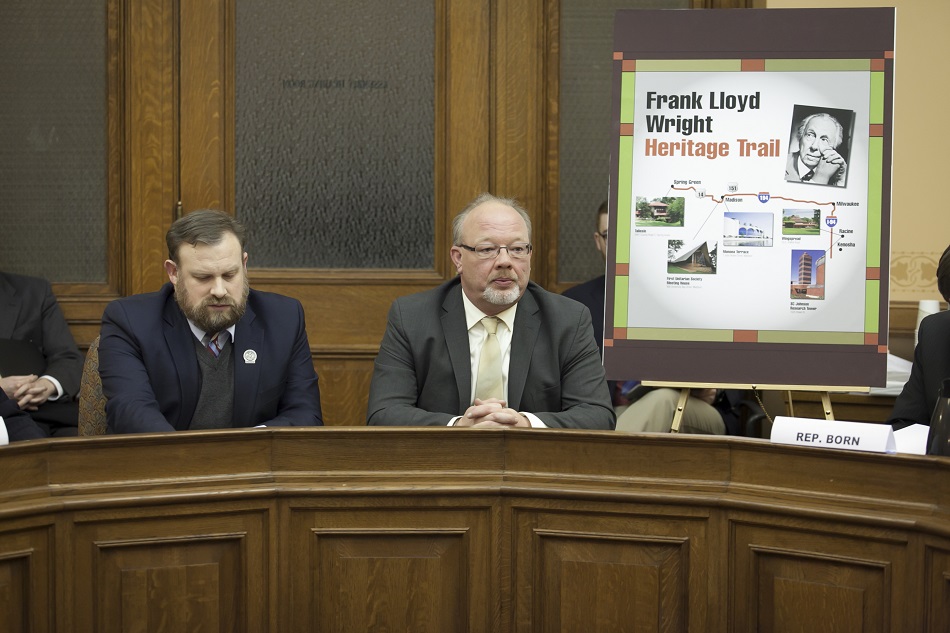
 |
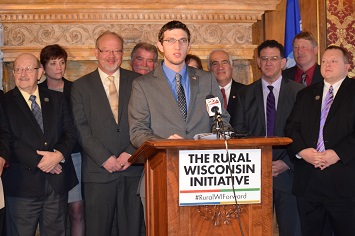 |
|
H.O.P.E. Bills Pass the Assembly |
Announcing the Rural Wisconsin Initiative. |
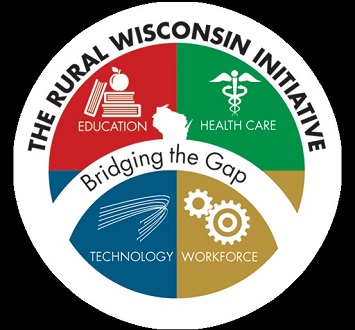 |
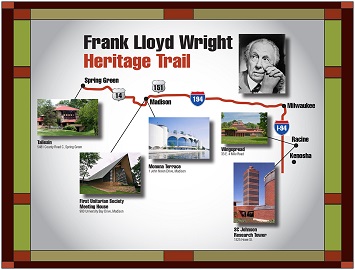 |
| Rural
Wisconsin Initiative; Bridging the Gap in Rural Wisconsin |
Frank
Lloyd Wright Trail Map |
| |
Sincerely,
 |

